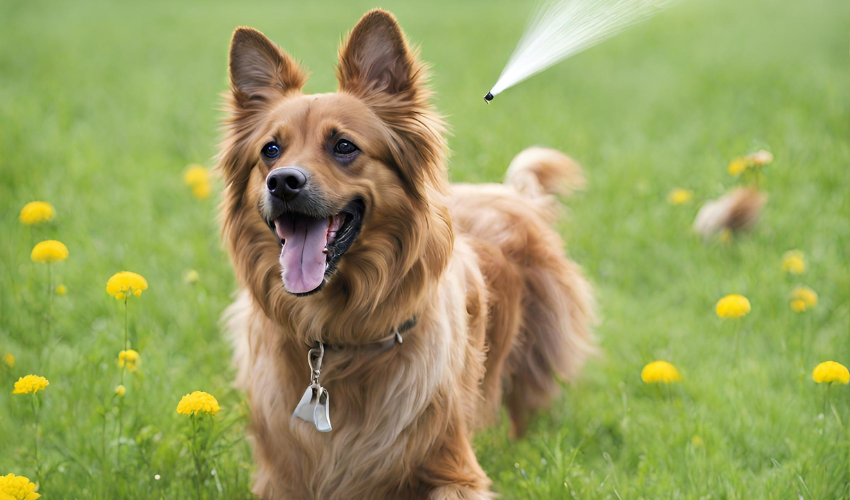When it comes to training and protecting our loyal canine companions, citronella spray is often recommended as a safe and effective option. However, many pet owners are left wondering: is citronella spray safe for dogs? In this article, we will delve into this common query and uncover the truth about using citronella spray as a dog training aid and deterrent.
Understanding Citronella Spray
When pet parents look for ways to keep their pups on their best behavior, they sometimes hear about a certain lemony-scented option. Derived from the oil of citronella plants, this type of spray aims to help manage doggy decorum without harm. Let’s get to know what this tool is and how it’s supposed to do its job.
What is Citronella Spray?
Citronella spray comes from the oils of certain plants, much like the ones used in citronella candles that keep bugs at bay. This natural oil has a distinct smell which bugs, particularly mosquitoes, find pretty off-putting. But it’s not just used for keeping insects away—people have found that it can also discourage our furry friends from misbehaving.
When it’s used for dogs, the spray is put into a little gadget, typically a collar, that releases a burst of citronella whenever it’s needed. The idea is that the sudden spray and the strong scent it gives off are unpleasant to dogs, but it doesn’t hurt them. This technique is especially considered when pet parents are searching for a gentle way to guide their pooches away from unwanted behavior without resorting to harsh methods.
How does citronella spray work?
Citronella spray harnesses the potent scent of the citronella plant to steer dogs away from unwanted behavior. When a dog does something it’s not supposed to, the spray emits a mist that envelops their nose and mouth. This isn’t harmful, but dogs usually find the strong citrus scent to be really unpleasant. It acts as a distraction, redirecting their attention away from the bad behavior.
Think of it as a scented reminder that helps dogs associate certain actions with the not-so-great smell of citronella. With consistent use, dogs start to realize, “Hey, when I do that, I smell something I don’t like,” and they will often decide to avoid doing it. It’s not just about the scent, though. The sound of the spray can also be a deterrence, serving as an additional cue for them to stop their behavior.
Risks and Concerns
When we spray something on or near our beloved pets, we want to be positive it won’t harm them. Exploring the possible dangers linked with citronella spray is vital to ensure we aren’t inadvertently putting our dogs at risk. Even products intended to be gentle can have unintended side effects, and it’s especially crucial to consider our furry friend’s health and well-being when using any type of repellent or deterrent. Let’s dive into what these risks might be, and learn how certain dogs might be more sensitive or even allergic to what we might think is a completely harmless substance.
Potential Risks of Citronella Spray for Dogs
When considering the use of citronella-based products to assist with training our furry friends, it’s crucial to weigh the potential downsides. While this substance is broadly labeled as non-toxic, that doesn’t mean it’s completely without risk. Citronella can be an irritant to a dog’s sensitive nose and respiratory system. If your pooch has a penchant for sniffing everything in sight, a spray of citronella might lead to sneezing, nasal discomfort, or worse, respiratory distress.
Beyond the nose, these sprays can sometimes cause a bit of a ruckus on the skin as well, particularly if your dog has unidentified allergies or skin sensitivities. Regular exposure, even to something as seemingly harmless as a plant-based deterrent, can evoke reactions ranging from mild redness and itching to more serious dermatitis. Always observe your dog’s reaction to citronella and consult with a veterinarian if you notice any adverse effects. After all, what works for one dog might not be a universal solution for all.

Impact on Sensitive and Allergic Dogs
When it comes to our furry friends with sensitive noses or existing allergies, using citronella could be a double-edged sword. On one hand, citronella is famed for being a natural repellent, yet on the other, it can cause discomfort or even health issues for pups with particular sensitivities. It’s crucial to keep an eye on your dog after using citronella-based products for the first time.
Some signs of a reaction include excessive scratching, sniffles, or skin irritation. If you notice your dog acting out of the ordinary or showing these symptoms, it’s best to stop using the spray immediately. Consulting with your vet is always the smart move to ensure that Fido stays happy and healthy. Remember, each dog is unique, and what’s safe for one might not be for another!
Effectiveness as a Training Aid
When it comes to correcting unwanted behaviors in our furry friends, trainers often turn to various tools, and one that frequently comes up for discussion is the use of plant-based deterrents. Among these, a lemon-scented spray has gained attention for its supposed gentleness and efficiency. Let’s take a closer look at how this lemony mist performs in the training arena and weigh it against other methods you might consider for your tail-wagging companion.
You might be interested: Can A Dog Visit My Apartment? How To Get Permission?
Behavioral Training with Citronella Spray
When it comes to teaching our furry friends right from wrong, some pet parents turn to citronella spray as a gentle reminder. It’s like a spray bottle of water but with a certain scent that dogs find unpleasant. The idea is simple: when your dog does something they shouldn’t, you use the spray as a deterrent.
So, does this method really help in molding a dog’s behavior? Many trainers affirm that it can be part of an effective training strategy, but it must be used correctly. It’s all about timing and consistency. Just as a dog associates a treat with good behavior, they can learn to link the citronella scent with unwanted actions. Yet, it’s important to always pair it with positive reinforcement techniques – like praise or a favorite toy – when they get it right. That way, training is not just about avoiding the bad but also about doing the good.
Alternatives to Citronella Spray
When looking for ways to train and manage your furry friend’s behavior, you might want to consider other options besides citronella. Positive reinforcement training is a powerful technique that rewards good behavior with treats, praise, or playtime, encouraging your dog to repeat those desired actions. This method is based on the science of how dogs learn and can help build a strong bond between you and your pet.
For those situations where you might need a deterrent, there are alternatives as well. Noise devices, like ultrasonic trainers, emit sounds that are unpleasant to dogs but not harmful. These can stop unwanted behaviors without any scent or residue. Additionally, sprays made with vinegar or lemon can serve as gentle but effective discouragements for your canine’s less desirable habits. Always remember, whatever method you choose, consistency and patience are key to successful dog training.
Safe Usage and Best Practices
Using citronella to manage your dog’s behavior comes with a set of guidelines that ensure your furry friend stays happy and unharmed. Best practices and safety tips are your go-to playbook for using this tool wisely. We’ll uncover the dos and don’ts, helping you implement citronella in the most caring way possible. Whether it’s for training or deterring unwanted behaviors, sticking to these suggestions can help you avoid any mishaps and keep your dog’s tail wagging.
Guidelines for Safely Using Citronella Spray on Dogs
When you’re considering citronella spray as a tool for your dog, it’s crucial to prioritize their safety. First and foremost, always choose a product that’s been designed specifically for dogs. These sprays are formulated to be mild and should contain only a tiny amount of citronella oil. It’s also important to check with your vet before using any new product with your furry friend.
Follow the Instructions
Diligently read and follow the instructions provided by the manufacturer. This will often include:
- Test for Allergies: Apply a small amount to a non-sensitive area to check for any adverse reactions.
- Spray Direction: Never spray directly into your dog’s face or eyes. Aim for the lower body or back.
- Dosage: Use the minimum amount of spray needed to achieve the desired effect, and avoid overusing the product.
- Citronella spray should be used as a part of a broader training strategy, and not as a frequent go-to correction. Remember, the goal is to create a positive learning environment for your dog, not to cause them stress or discomfort. Keep sessions short, and always follow up with rewards and praise for good behavior. By using citronella spray responsibly, you can help nurture a well-behaved and happy pup.
Best practices for training and deterring with citronella spray
Training our furry friends with care and patience is always the goal. When citronella spray is chosen as a tool for this journey, it’s wise to follow some key practices to ensure it’s done with love and effectiveness. First and foremost, positive reinforcement should be the star of the show. The spray should never be the leading act but rather a supporting character, encouraging pups to learn what’s expected without fear or distress.
When you do reach for the citronella spray, use it sparingly and in conjunction with rewards for good behavior. Imagine it like adding a pinch of spice to a recipe – a little goes a long way. And always keep an eye on your dog’s reaction to ensure they’re comfortable and responding well to training. The best trainers know that every dog is unique and tailoring your approach to your dog’s personality will make all the difference.
Debunking Myths
Let’s squash some tall tales! There’s a bunch of myths swirling around about our furry friends and their reactions to citronella. It’s high time to separate fact from fiction and get to the bottom of what’s real and what’s just a bunch of hocus-pocus when it comes to this fragrant tool for your pooch. So, buckle up as we dive into the nitty-gritty and dispel the myths about those spritzes and sprays that have been floating around the dog park.
Common Misconceptions about Citronella Spray for Dogs
There are quite a few tall tales floating around about citronella spray and its effects on dogs. A popular belief is that it’s the magic bullet for all types of behavioral problems. However, citronella spray isn’t a one-stop shop for training. While it might discourage certain behaviors temporarily, it doesn’t solve the underlying issues causing those behaviors.
Another myth is that because citronella is natural, it’s totally harmless. This can be misleading. Just because something is natural doesn’t guarantee that it’s safe for every pooch. Each dog is unique and some might have adverse reactions to natural products too. Always remember, when dealing with our furry friends, it’s not just what we use but how we use it that counts.
Conclusion
As responsible pet owners, it’s natural to seek out safe and humane ways to train and protect our dogs. The use of citronella spray as a training aid has sparked both curiosity and concern, but understanding its safety and effectiveness is key to making informed decisions. By exploring the nuances of citronella spray for dogs, we can ensure that our four-legged friends receive the best care and training possible.
- Smelly House Because of Dog? Take These Hygiene Tips - May 20, 2025
- How to Introduce a Dog To a Cats Without Chaos - May 6, 2025
- 4 Best Cavapoo Rescues in the UK 2024 - April 5, 2024








